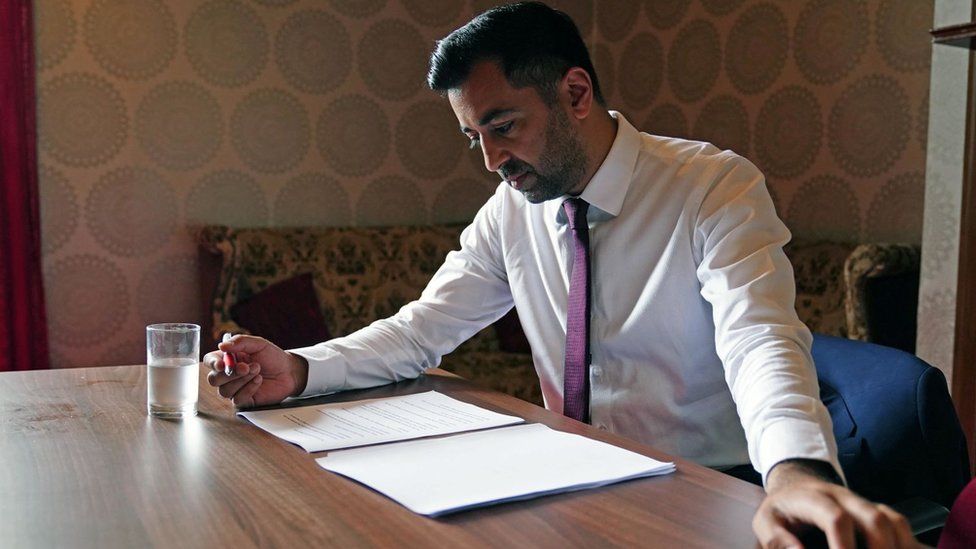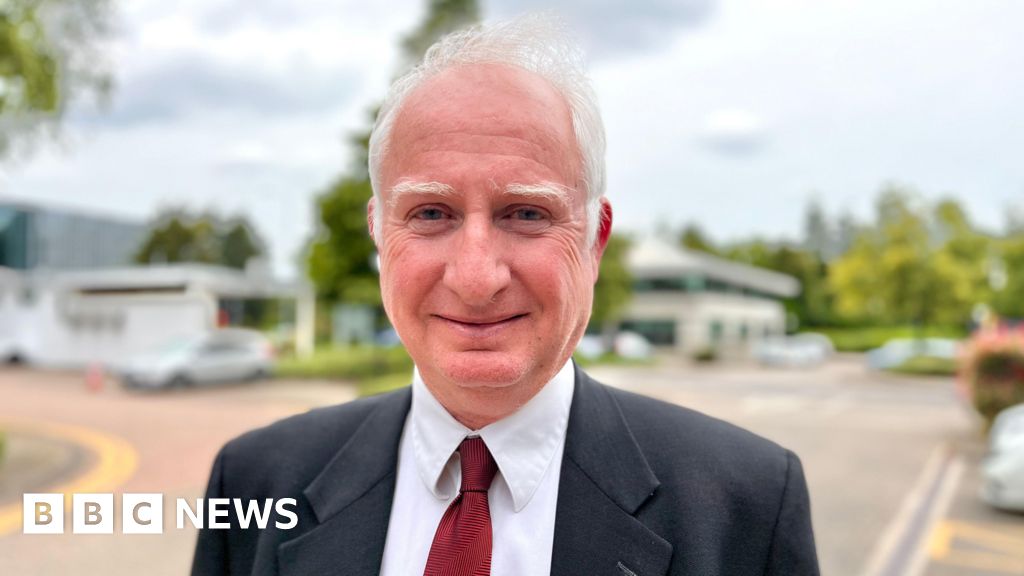ARTICLE AD BOX
 Image source, PA Media
Image source, PA Media
Humza Yousaf looked over his plans ahead of delivering them to members who attended a special party gathering
By James Cook
Scotland editor
"If we can't win," Nicola Sturgeon told me last November, "we don't deserve to be independent."
At the time, Ms Sturgeon defined "winning" as securing at least 50% of the electorate's support for the SNP - and therefore for independence - in a general election.
The UK Supreme Court in London had just ruled that the Scottish Parliament could not organise its own referendum, closing off one potential avenue for constitutional change.
But Ms Sturgeon's response, to propose treating a majority vote share at the next general election as a mechanism to advance her cause, was controversial even within her own party, to the extent that she cited it in February as one reason for her resignation as SNP leader and First Minister of Scotland.
Image source, PA Media
Image caption,Nicola Sturgeon suggested the next general election should be a "de facto" referendum
So the question, as we arrived in the heat and humidity of Scotland's sunniest city for an SNP convention on independence, was this - would Humza Yousaf back his predecessor's strategy, amend it, or abandon it?
Remarkably, as he left the stage of Dundee's Caird Hall, there was still confusion about the answer, ambiguity which one source close to the first minister suggested to me was deliberate and useful.
Perhaps. The speech was certainly warmly received in the Caird Hall but as delegates streamed out under the blazing midsummer sun, doubts emerged too.
One SNP member told me that the party's foot soldiers were fed up with being marched up the hill only to be marched down again.
I heard at least half a dozen different interpretations of Mr Yousaf's policy from delegates debating the details in corridors and cafes.
Two possible plans
So what did he actually say?
The first minister set out two potential paths to independence.
The first was for the SNP to win a majority of seats - but not necessarily a majority of votes - in Scotland at the next general election and for the UK government to react by transferring the power to hold a referendum on independence to Holyrood as it did in 2014 when voters rejected the proposition by 55% to 45%.
The second path was that London could respond to such an election result by simply opening negotiations with Edinburgh on Scotland leaving the UK.
These are campaigning positions. Privately senior SNP figures do not expect either course of action to be embraced by their opponents, especially if the SNP loses seats in the House of Commons at the election, which must be held by January 2025.
Several SNP parliamentarians at the convention endorsed Mr Yousaf's approach but two, while praising his positive rhetoric and focus on independence, expressed doubts about his strategy.
'Taking majority with us'
Both Pete Wishart MP and Ash Regan MSP insisted a majority of votes, not a majority of seats, would be needed before Scotland could seek independence.
Ms Regan reiterated the proposal that she advanced during her unsuccessful bid for the SNP leadership: that if pro-independence parties together achieved more than 50% of an election vote in Scotland, that would constitute a mandate "to begin negotiating for Scotland to leave the UK".
Mr Wishart agreed, telling me: "It would have to be 50% plus [of votes] for it to carry any credibility. And I just don't believe it would be possible to move to a situation where we're trying to progress independence, not taking a majority of the Scottish people with us."
The MP for Perth and North Perthshire said he was confident that his view would end up as party policy when the matter was discussed at the SNP's conference this autumn.
Image source, PA Media
Image caption,Humza Yousaf has a Plan A and a Plan B for Scottish independence
When I put it to Mr Yousaf that he was lowering the bar set by Ms Sturgeon he replied, pointedly: "It might may have escaped your attention. I'm the leader of the SNP."
He did, though, accept that anything other than his "Plan A" of a negotiated referendum was, by definition, "suboptimal" and he promised to use the coming months to lay the foundations for an independent Scottish state.
Of course both Rishi Sunak's Conservatives and Sir Keir Starmer's Labour Party insist they will not agree to a referendum if they win the election, let alone that they will negotiate Scotland's departure from the union without one.
Mr Yousaf's team know fine well that, barring a dramatic development and a stunning surge in support for independence, that position is unlikely to change.
But they also argue that focusing relentlessly on the constitution could help push support for independence into majority territory by contrasting the UK's current economic woes with their vision of a prosperous sovereign Scotland within the European Union.
The other explanation for their approach is that party strategists are concerned about polling which suggests a widening gap between support for independence and support for the SNP.
While independence appears stable at an average of 48% in recent surveys, the proportion of people who say they would vote SNP at the next general election has apparently slumped following Ms Sturgeon's resignation and amid a police investigation into the party's funding and finances.
Image source, Reuters
Image caption,Humza Yousaf says he wants to bring the "Yes" movement together
Mr Yousaf's approach appears designed to hitch the party back on to the independence wagon.
He is not the only one vying to take the reins of the independence movement. Alex Salmond's Alba Party has tried to align itself with impatient grassroots supporters, some of whom argue that there is a third potential route forwards - taking their campaign to the streets.
While Mr Yousaf was addressing his party in Dundee thousands of independence campaigners were preparing to march from Stirling Bridge to Bannockburn, from the site of one famous victory over the English in the First War of Independence in 1297 to another in 1314.
On what was the anniversary of the second day of the Battle of Bannockburn, one marcher at the All Under One Banner event told the BBC that the conference in Dundee was "a waste of time".
"We're all independence, and we should all be basically fighting for the one cause. We shouldn't be arguing against each other," said another.
A third campaigner said "they need to mobilise the movement like this".
In a speech which appeared in some respects designed to be all things to all people, Mr Yousaf appeared to reach out to the wider "Yes to independence" movement, promising to ensure that a rally on September 2 was "the biggest our cause has ever seen".
But the SNP leader also sounded a note of caution.
"There is no route to independence," he warned, "other than through a lawful democratic process."

 1 year ago
35
1 year ago
35








 English (US)
English (US)